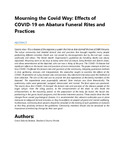Please use this identifier to cite or link to this item:
http://ir-library.mmust.ac.ke:8080/xmlui/handle/123456789/2369Full metadata record
| DC Field | Value | Language |
|---|---|---|
| dc.contributor.author | Bakesia, Grace Buluma | - |
| dc.contributor.author | Orinda, Shadrack Okumu | - |
| dc.date.accessioned | 2023-10-23T11:31:08Z | - |
| dc.date.available | 2023-10-23T11:31:08Z | - |
| dc.date.issued | 2023-08-28 | - |
| dc.identifier.uri | https://doi.org/10.51867/scimundi.3.1.3 | - |
| dc.identifier.uri | https://sciencemundi.net/ojs/index.php/scimundi/article/view/18 | - |
| dc.identifier.uri | http://ir-library.mmust.ac.ke:8080/xmlui/handle/123456789/2369 | - |
| dc.description.abstract | Corona virus-19 is a disease of the respiratory system that has to date claimed the lives of 5684 Kenyans. The Luhya community had detailed funeral rites and practices that brought together many people performing different activities. Death was not caused by microorganisms but by the evil eye’, curses, witchcraft, and others. The World Health Organization's guidelines for handling deaths are clearly stipulated. Mourning went on for days to bring some kind of closure, bring families and friends closer, and allow remembrance of the departed, who are now a thing of the past. The COVID-19 disease had significant effects on the burial rites and practices of most communities. The paper attempts to find out how COVID-19 affected the funeral rites and practices of the community. Adopting qualitative methods in data gathering, analysis, and interpretation, the researcher sought to examine the effects of the COVID-19 pandemic on Luhya funeral rites and practices. Key informant interviews were the methods of data collection. The aim of this tool was to unravel the dire experiences of the family members of the departed. The respondents were purposefully selected. Data analysis was done thematically. The preliminary codes were generated, swapped, demarcated, and named. The final report was produced. The results show that COVID-19 changed the funeral rites and practices of the Abatura people of the larger Luhyia. From the ailing process, to the announcement of the dead, to who made the announcement, to the mourning period, to the preparation of the body for burial, the burial site, positioning in the grave, burial programs, and the entire interment process. These results show that the changes have caused psychological distress. It is recommended that relevant authorities put in place measures to safeguard funeral activities, as they have effects on people's physical and mental wellbeing. Furthermore, community focal persons should be consulted in the making of such guidelines on funerals so that they positively embrace the guidelines. Community members should also be sensitized to the importance of embracing change for their own good. | en_US |
| dc.language.iso | en | en_US |
| dc.publisher | SCIENCE MUNDI (Multidisciplinary Universal Nucleus for Dissemination of Innovation and Research in the Sciences) | en_US |
| dc.subject | Mourning,Covid, Way, Effects, COVID-19, Abatura, Funeral, Rites, Practices | en_US |
| dc.title | Mourning the Covid Way: Effects of COVID-19 on Abatura Funeral Rites and Practices | en_US |
| dc.type | Article | en_US |
| Appears in Collections: | Gold Collection | |
Files in This Item:
| File | Description | Size | Format | |
|---|---|---|---|---|
| Mourning the Covid Way.pdf | 402.46 kB | Adobe PDF |  View/Open |
Items in DSpace are protected by copyright, with all rights reserved, unless otherwise indicated.
